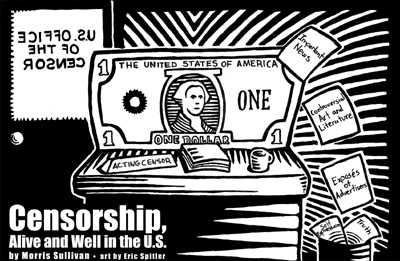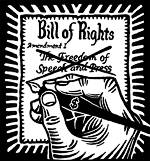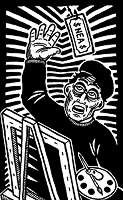IMPACT
press
April-May '00 Articles:
Censorship:
Alive & Well in U.S.
Notes from the Cultural Wasteland
Mindpower:
The Lesser of
2 Evils
Rape Shield Laws
Quickies
(music reviews)
Leggo My
Agenda!
E-Mail Us
Your Comments
Archives
Subscribe to IMPACT
Buy IMPACT T-Shirts
Ordering Back Issues
Home |
 CENSORSHIP,
Alive and Well in the U.S.
by Morris Sullivan
art/Eric Spitler
"Chemical Corporations Profit Off Breast Cancer!"
"Recycled Radioactive Metals May be in Your Home!"
"US Tax Dollars Support Death Squads!"
"Student Activists Gunned Down on Chevron Oil Facility!"
When you read the headlines above, did you immediately assume they're the ravings of a conspiracy-theory maniac? Do they sound like something the National Enquirer might print? They couldn't possibly be true, right? After all, this is America, and in this country, with our right to know and the freedom of the press, information like this couldn't possibly escape media coverage. Could it?
 According to Project Censored, a project of Sonoma State University, these stories are among the 25 most under-reported stories of 1998. The stories did see print; however, the mainstream media largely ignored them. Circumstances like this often prompt accusations of censorship. According to Project Censored, a project of Sonoma State University, these stories are among the 25 most under-reported stories of 1998. The stories did see print; however, the mainstream media largely ignored them. Circumstances like this often prompt accusations of censorship.
Strictly speaking, we have no censorship in the United States. Censorship involves having a government official designated to review material intended for publication to determine whether or not the material may be published or otherwise produced, such as film, television, theatre, and so on. There is no Office of the Censor in the American government. However, that doesn't mean that there are not other, subtler forms of suppressing information and limiting expression.
Some of the stories the media overlooked and under-reported could have caused widespread panic. In November of 1996, for example, a Russian space probe exploded over Chile and Bolivia, scattering bits and pieces of itself over a 10,000 square mile area. Among those bits and pieces was a half-pound of plutonium. In an article published by Covert Action Quarterly in spring of 1997, Dr. Helen Caldicott, President Emeritus of Physicians for Social Responsibility stated that "one pound (of plutonium), if uniformly distributed, could hypothetically induce cancer in every person on earth." The story should have been on the minds of everyone in the Americas; yet one of the few papers that printed it, the New York Times, buried it on page 7.
Other buried stories could easily lead to boycotts or increased regulation. A 1997 report published by Amnesty International listed 42 American firms that manufacture instruments of torture, then export them to to South Africa and other nations accused of human rights violations. The products examined include cattle prods, stun belts, shock batons, and other electrical devices.
Two small alternative publications, Rachel's Environment and Health Weekly and The Green Guide have each published exposés of companies like Zeneca Pharmeceuticals. They allege the company produces both carcinogenic pesticides and other chemicals alongside their cancer treatment drugs.
Perhaps no American student activists have been shot by law enforcement and military personnel since Kent State (during the Vietnam era). That doesn't mean student activists haven't been killed during confrontations with American interests elsewhere. In Nigeria, a group of protestors was attacked by Nigerian soldiers, leaving two dead and several injured. For three days in May of 1998, the students had protested Chevron's destruction of a wetlands area of the Niger Delta, and had asked to meet with Chevron officials. On May 28th, Chevron employees helicoptered Nigerian National soldiers to the barge, and the confrontation began.
Literally dozens of events like these occur every year, yet the mainstream media often eschews them. There are a variety of reasons for the under-reporting. Of course, there are government and corporate cover-ups. You can't really blame "censorship" for that. However, the American media itself does most of the "censoring." Why? Doesn't our freedom of the press virtually guarantee that stories like these, stories that should be important to every citizen, receive coverage?
In our capitalist society, the news media are at the mercy of the dollar--in most cases, the advertising dollar. The mainstream media especially must rely on its advertising contracts to pay its costs and generate its profits. There are good aspects to that; the media is free from the control of government which otherwise might be its main source of funding (as in the case of the BBC, for example).
The down side, however, is that the media is still under the influence of its source of dollars--and, as the old saying goes, "you don't shit where you eat." In other words, if you want to keep bringing in the advertising bucks, you don't print an exposť of your advertiser. More and more of the big media--the large daily papers, radio, and television news--are owned or controlled by giant corporations.
Fifty years ago, the owner/publisher of your daily paper probably lived in your neighborhood; now "he" is a group of stockholders and a collection of hired guns whose job is to make the stockholders a profit. As a result, journalistic standards have begun to fall to the wayside, not able to hold their own against the drive for return on investment. Fifty years ago, a paper that didn't adequately report important news could end up losing a battle to a new, more aggressive competitor. Today, it would be virtually impossible for a newcomer in the average large market to go head-to-head with an established paper that has unlimited funding available from its giant corporate owner.
Of course, advertisers want a paper to have lots of readers--distribution numbers are the key to boosting advertising rates. One would think, therefore, that better coverage of important stories would increase readership but this is often not the case. The line between the news and entertainment media has become increasingly blurred; as with any other medium, the result is that the news becomes watered down in order to avoid offending readers.
Perhaps even more significantly, the importance of a news story often has more to do with its "sensational" qualities than its inherent significance. For example, it's hard to imagine that virtually nothing newsworthy happened last year aside from President Clinton's sexual dalliances, which took up the vast majority of the ink and airtime devoted to disseminating information. How many stories fell through the cracks during the months that we were treated to titillating details about Monica Lewinsky's oral sex techniques?
An even more dramatically--and pathetically--absurd example of this occurred during the trial of O.J. Simpson. Americans devoured every sordid detail of O.J.'s life and his relationship with Nicole; meanwhile, a far more important trial was taking place on the other side of the Atlantic. While California prosecutors tried to convict one man for killing his estranged wife, an international court prosecuted a group of men for perpetrating war crimes against thousands of people in the Bosnian conflict.
Local and network television news is especially bad about selecting stories based on "drawing power" rather than importance. There is a thin and very blurred line between "news" and "entertainment," especially with television. Watch prime time network television sometime, and pay attention to the teasers the station runs every half-hour or so. If they do their job, these 10-second spots will keep a viewer tuned in after the sitcoms are all over. Often, the "most important" story of the night, according to the teasers, is the one that gives the station an excuse to broadcast clips of scantily clad women or a particularly gruesome slant. When the news finally arrives, important stories are often glossed over quickly or ignored altogether in favor of fluff.
 What do The Grapes of Wrath, Sophie's Choice, and A Clockwork Orange all have in common? Two things--they're all part of Modern Library's 66 Best Books of the Twentieth Century list, and all have been banned or challenged. What do The Grapes of Wrath, Sophie's Choice, and A Clockwork Orange all have in common? Two things--they're all part of Modern Library's 66 Best Books of the Twentieth Century list, and all have been banned or challenged.
In America, art and literature are not immune to suppression. The most obvious limitations on freedom of expression come from local and state ordinances that attempt to regulate "obscenity" or other "indecent" activity. For instance, restrictions on the mailing of "obscenities" generally prohibited the mailing of published materials dealing with homosexuality. This went unchallenged until 1954, when a gay publication, ONE, won a Supreme Court decision allowing its distribution by mail.
In the early part of the century, entire casts of scandalous Broadway plays were arrested. In 1927, the state of New York enacted a law to prohibit theatres from showing plays that portrayed lesbians and gay men. The statute stayed on the books until 1967.
Several communities, including Boston, forced the closing of productions of Hair. "Obscenity" was usually cited as the reason for the closings; the play contains a brief nude scene and a song called "Sodomy" (the song's lyrics consist of a list of "taboo" sexual practices, like fellatio and cunnilingus.) The more likely reason for the attacks on Hair, however, were its social and political stance. The show originated and became popular during the 1960s, and the play had a clear antiwar, pro-drug, counterculture point of view, which no doubt infuriated the "establishment" power structure.
Another form of "censorship" more subtle than legislation also affects what you can read, see, and hear. Again, the means of control is cash flow; however the "cash" comes in the form of public funding rather than from advertisers or other consumers. In these situations, the pressure comes from government, but less directly. Government doesn't prohibit the production or publication of the offending material--it just threatens to cut off the funding.
Visual artists and the museums that display their work often bear the brunt of these attacks. In the early 1990s, outraged religious-right groups manipulated the facts about an exhibition of Robert Mapplethorpe's homoerotic and Andres Serrano's "sacrilegious" photographs, along with a PBS documentary about homosexuals, and almost managed to get funding shut down for the NEA, NEH, and PBS. This type of activity has repeated itself on local and state levels, as well. For example, a Cobb County, Georgia production of Terence McNally's play, Lips Together, Teeth Apart, generated such controversy that the County Commission approved a general anti-gay resolution and voted to end the county's arts funding.
Libraries, too, are publicly funded. As such, they are sometimes required to consider "challenges" against books--that is, to examine their constituents' desire to have a book pulled from its shelves. Often, the work is challenged because of sexual content. However, The Grapes of Wrath was challenged because of its religious positions, for example, and Huckleberry Finn over its use of the word "nigger."
Publishers and producers of art and entertainment media don't have to be dependent on public funding to be subject to cash-flow-driven censorship. For example, boycotts threatened by religious-rights groups influenced the removal of Playboy and Penthouse from the shelves of 7-11 and pressured both Disney and Universal to institute community-by-community prohibitions against screenings of their films Priest and Last Temptation of Christ.
The film industry has often over-reacted to such challenges by practicing self-censorship. From 1930 to 1956, the movie industry censored itself under the "Hays Code," which prohibited the showing of a woman's inner thigh or navel, as well as submachine guns and toilets, among other weird items. The code also required that lesbians and gays not be portrayed, unless there were shown in a negative light. Incidentally, the industry attempted to regulate actors' off-screen behavior by requiring them to adhere to a "morals" code.
Even comic books have not been immune to such actions. During the 1950s, parents and educators cried out against comics like EC's horror series, from which "Tales from the Crypt" arose. Released in 1954, Seduction of the Innocent created a storm that eventually landed the comic book on the floor of the U.S. Senate, where a subcommittee originally formed to investigate juvenile delinquency investigated the issue.
The government took no action against comic publishers, but the industry, like the movie studios, decided to self-censor, creating the Comics Code Authority. The Authority generated a list of restrictions; comic publishers could either comply with the restrictions or risk having distributors refuse their product. Among other things, the 40-item list of restrictions prohibited the portrayal of policemen in any way that might create disrespect for authority and required that "in every instance good shall triumph over evil and the criminal punished for his misdeeds." It banned the use of "horror" or "terror" in the title of a comic; eliminated "lurid" and "unsavory" illustrations; and prohibited scenes involving vampires, werewolves, and zombies. And of course the code prohibited nudity and salacious illustration, requiring females to be "depicted in dress reasonably acceptable to society." It went even further, stating, "The treatment of love-romance stories shall emphasize the value of the home and the sanctity of marriage."
Ironically, such censorship usually has an effect opposite that which is intended. It is unlikely, for example, that many of us would ever have heard of Serrano's "Piss Christ" had the pressure groups not created a controversy over it. After Time Magazine reproduced it for a cover story, many more mainstream Americans were exposed to the photo.
In America, a thought worth expressing will find a means of expression. Often a new means will be even more effective than the "censored" one. The comics controversy serves as a great example of this "opposite effect" phenomenon. The publishers of EC Comics, Harvey Kurtzman and William Gaines, simply changed to a magazine format and sought an older crowd that was willing to pay for it. Two good examples of this change are Mad Magazine and Tales from the Crypt. They have become cultural icons, while many of those that safely adhered to the code are long-forgotten. Young artists, like Robert Crumb, who were influenced by Kurtzman and Gaines, simply took their work underground, creating a virtually new medium that now outsells the old, drugstore-variety kid's comic.
The suppression of information is not the only means government and pressure groups have of controlling information and thus influencing your attitudes, opinions, and lifestyle choices. For example, in an attempt to create enthusiasm for its New Deal, the Roosevelt administration backed John Steinbeck's epic study of the Great Depression, The Grapes of Wrath (ironically one of the most often challenged library books). In a more recent example, the U.S. government proposed giving money to television producers who agreed to insert anti-drug messages in television shows.
We live in a free society, and with that freedom comes responsibility. We also live in a capitalist society, and in such a society, you get what you pay for. We are all consumers of information, and whether the medium for communicating that information is a TV newscast, a visit to an art museum or theatre, or the daily paper, the consumer's willingness to support that medium helps dictate its content.
As citizens we do have options. Alternative publications have a slant and a bias. However, alternative weeklies like the Orlando Weekly (Florida), Shepherd Express (Wisconsin), Pacific Sun News (Marin County, CA), and many others, compete with the mega-corporation-controlled dailies in their area. Many do so by digging a little deeper into stories of which the mainstream press just touches the surface. You have to dig a little deeper to find the truth, but you can often find more honesty and informed reporting in magazines like Covert Action Quarterly and The Utne Reader.
If you're happy with an endless stream of dead-baby-stories on the nightly news, then watch it, buy from its advertisers, and don't bitch when you discover you have no clue what's really happening in your world. If, on the other hand, you want truth instead of fluff, throw your support to the media that presents it.
•
Email your feedback on this article to impact-press@mindspring.com.
Make an IMPACT
Other articles by Morris Sullivan:
|

 According to Project Censored, a project of Sonoma State University, these stories are among the 25 most under-reported stories of 1998. The stories did see print; however, the mainstream media largely ignored them. Circumstances like this often prompt accusations of censorship.
According to Project Censored, a project of Sonoma State University, these stories are among the 25 most under-reported stories of 1998. The stories did see print; however, the mainstream media largely ignored them. Circumstances like this often prompt accusations of censorship.
 What do The Grapes of Wrath, Sophie's Choice, and A Clockwork Orange all have in common? Two things--they're all part of Modern Library's 66 Best Books of the Twentieth Century list, and all have been banned or challenged.
What do The Grapes of Wrath, Sophie's Choice, and A Clockwork Orange all have in common? Two things--they're all part of Modern Library's 66 Best Books of the Twentieth Century list, and all have been banned or challenged.